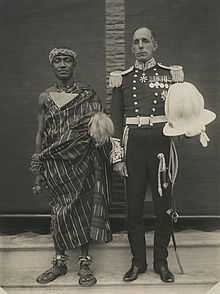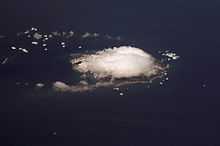Arnold Wienholt Hodson
| Sir Arnold Wienholt Hodson | |
|---|---|
 | |
| Governor of the Falkland Islands | |
| In office 1926–1930 | |
| Preceded by | John Middleton |
| Succeeded by | James O'Grady |
| Governor of Sierra Leone | |
| In office 1931–1934 | |
| Preceded by | Joseph Aloysius Byrne |
| Succeeded by | Henry Monck-Mason Moore |
| Governor of the Gold Coast | |
| In office 1934–1941 | |
| Preceded by | Shenton Thomas |
| Succeeded by | Alan Burns |
| Personal details | |
| Born | 1881 |
| Died | 1944 |
Sir Arnold Wienholt Hodson, KCMG (1881 – 1944) was a British colonial administrator who was Governor in turn of the Falkland Islands, Sierra Leone and the Gold Coast.
Background
Hodson was born in Bovey Tracey, Devonshire, in 1881. He was the eldest son of Algernon Hodson and Sarah Wienholt. He was educated at Felsted. Hodson was in Central Queensland 1900 to 1902 and was part of the Queensland Contingent for South Africa in 1902. He served in the Transvaal 1902-04. From 1904 until 1912 he was in the Bechuanaland Protectorate Police Force. His duties as a policeman and magistrate took him into the most remote parts of the territory, one of the his missions being the Damaraland frontier at the time of the Herero and Nama Wars in German South-West Africa. He was also much involved in trying to reconcile conflicts between tribal chiefs. His several political missions cover a most important period of the history of Botswana.
One of his journeys, in 1906, was made in the company of Sir Ralph Williams, Resident Commissioner, and was from Serowe to Livingstone and the Victoria Falls via Lake Ngami. Four years later Hodson organised a hunting trip for High Commissioner Selborne, from Pandamatenga to Selous' old camp on the Mabebe Flats and on to the Chobe. He then went on to Somaliland 1912-14. He served as Consul in Southern Abyssinia (now Ethiopia) 1914-23, then Consul in South West Abyssinia from 1923-1926.
Colonial governor

Hodson was Governor of the Falkland Islands 1926-30. During his tenure, a mountain - Mount Hodson (56°42'S, 27°13'W) - the summit of Visokoi Island in the South Sandwich Islands - was named after him.
The most notable achievement of Arnold Hodson's reign as governor of the Falkland Islands was the development of radio communications within and beyond the islands.[1] Working with the BBC, he connected the islands to the imperial broadcasting network. He also established a radio station in the islands. When he later moved to Sierra Leone and the Gold Coast, he continued work on his visions of establishing effective communication lines between various parts of the British Empire.
He was Governor of Sierra Leone 1930-1934, where he was known as the 'Sunshine Governor' and was responsible for the creation of the Sierra Leone Broadcasting Service, which launched on 7 May 1934. That same year he was knighted. Finally, he was Governor of the Gold Coast (now Ghana) 1934-1941.
Hodson married Elizabeth Charlotte Sarah Hay, daughter of Major Malcolm Vivian Hay in 1928. They had two daughters, Rosemary and Elizabeth. He died on the 26th May 1944 ('Who was who' 1980, p. 550).
Bibliography
Hodson was the author of a number of books:
- Trekking the Great thirst: travel and sport in the Kalahari Desert. London: T.F. Unwin.
- An elementary and practical grammar of the Galla or Oromo language. London: Society for Promoting Christian Knowledge.
- Seven years in Southern Abyssinia. [London]: T.F. Unwin.
- Where lion reign: an account of lion hunting and exploration in South West Abyssinia. London: Skeffington and Son Ltd.
Hodson also wrote a play called 'The downfall of Zachariah Fee'.
References
- ↑ "Arnold Wienholt Hodson". Retrieved 26 January 2013.
|
